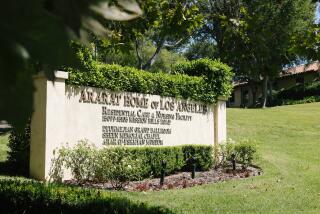Penmanship Blamed in Care Home ‘Deficiency’
Officials of the Palomar Pomerado Hospital District said Friday that one of the alleged “serious deficiencies” identified at its Escondido convalescent hospital by state licensing officials may be the result of a doctor’s poor penmanship.
Dan Murray, administrator of the district’s Palomar Convalescent Center, said one of the worst charges made against his skilled-nursing facility was that a woman lost 50 pounds over eight months.
“But that was her physician’s plan,” Murray said at a press conference held at the attractive, 96-bed facility. “She was diabetic and obese.”
Couldn’t Read Notes
Murray said inspectors from the state Department of Health Services, which conducts annual certification inspections of such facilities, apparently could not read the doctor’s notes on the care of the woman, which called for her to lose that much weight.
“The patient is doing very well. The patient is pleased with her condition,” Murray said.
The other of the most serious allegations, he said, was that a woman in her 80s fractured a hip when she fell trying to get out of bed. The same patient allegedly fell four more times--without injury--according to the state’s report, Murray said.
Studying Restraints
Short of restraining elderly, fragile patients in their beds, such falls cannot altogether be prevented, Murray said.
Nonetheless, the staff is being trained to keep better watch over the patients, and the management is studying greater use of bed restraints, said Robert J. Harenski, administrator of Palomar Medical Center, which oversees the convalescent hospital.
The hospital district acknowledged Thursday that two employees have been suspended pending a review of their job performance since the state’s findings. The district has not identified the two or their roles.
Federal Report Due
Murray and Harenski on Friday declined to identify other problems found by the state, other than to say they were less serious than the weight loss and broken hip incidents. Each of the problems has either been corrected or is being corrected, they said.
State licensing officials in San Diego said they cannot discuss the details of their inspection until hospital administrators receive a final report from the federal Health Care Financing Administration, which determines Medicare and Medi-Cal eligibility.
Harenski said he will meet with federal officials in San Francisco on Tuesday to respond to the state’s report. If HCFA officials uphold the state’s findings, the district will have until May 7 to make the necessary corrections, or risk losing Medicare and Medi-Cal patients, who make up the majority of patients at the long-term care facility.
“Patient care here has been very good, even excellent,” said Murray, “but in some cases our documentation has been inconsistent. We only received our license last July, so basically we’re still in a start-up mode.”
Because the convalescent center is affiliated with a hospital, it cares for more acutely ill patients than other similar facilities, Murray said. “Nevertheless, we acknowledge our deficiencies and request a state re-examination in the near future that will give us a clean slate.”
More to Read
Sign up for Essential California
The most important California stories and recommendations in your inbox every morning.
You may occasionally receive promotional content from the Los Angeles Times.










